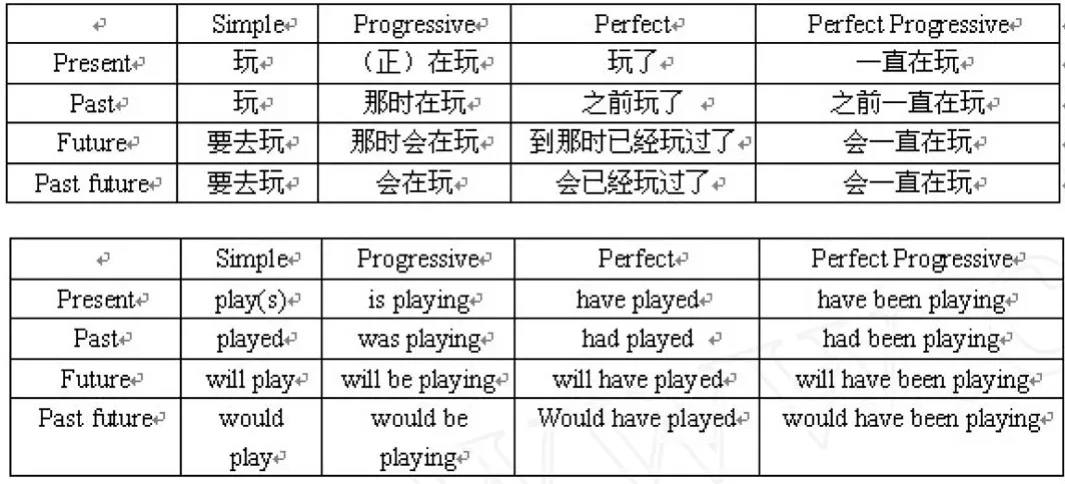A Research of the D istinctions between English and Chinese Tenses
◆W ang Huabin Zhang Chao
(Schoo lof Foreign Languages,Sun Yat-sen University)
A Research of the D istinctions between English and Chinese Tenses
◆W ang Huabin Zhang Chao
(Schoo lof Foreign Languages,Sun Yat-sen University)
By observing the gramm ar system sof Chinese and English,it is found that the usesof tenses between the two languages are very d ifferent.It turnsout that the Chinese expressionsof tensesaremore casualand variable,w ithout fixed rules,while for English,more regu lar.The distinctwaysand patternsof expressing tenses betw een Chinese and English give rise tomo re frequen terrorsm ade by students.Thus,on ly by a thorough and profound understand ing of these distinc tionscan we find a betterway tomaster the usesof tenses,which requires a reasonable comparison of the tenses between Chinese and English.
tense verbal inflection auxiliary verb tense expressions d istinc tion
一、The BasicW ays of Expressing D ifferen t T im e Po in ts in Ch inese

二、Fea tures of Eng lish and Ch inese ten ses
1.Verbal Inflection
W hen w e compare Chinese w ith English,we can see that Chinese has no such verbal inflection at all like that in English.A ccording to this study,it is made clear thatChinese hasvery differentways in using the tenses from English. In sim p le aspect,w e on ly need to add tim e adverbials tom ean presen to r past, like in the sentence“我刚才去图书馆了”,“gang cai(刚才)”in Chinese has already show n them eaning of the past,so there isno need to change the form of the character“qu(去)”.And actually,this is also due to a feature of Chinese characters thatwe cannot change the form of character itself.Every character isa unique one,itcannotbe added a stroke like adding“-ed”or“-ing”to an English verb.In progressive and perfective aspects,the situationsare likew ise.Forexamp le,“have done”can be represented by“le(了)”in the sentence,“She has already finished allof her homework.(她已经完成‘了’所有的作业)”.A lso in“He is p laying the p iano at themoment(他这会儿正在弹钢琴)”.
2.Auxiliary Verb
Auxiliary verbs are very important as reviewed.In aword,tensewou ld not be tensew ithoutauxiliary verbs.In English,usages of auxiliary verbs are very regular,evenmore regular than the rulesof verbal inflection.A lthough it is very regular,seem ingly easier tomaster,it still remains a difficulty for some intermed iate learners.This difficu lty is reflec ted in the firstpartof the survey conducted in the previous chap ter.Forexamp le,some students do notknow when to use" w illhave been"and"would have been",thus errors aremade. In Chinese, words like auxiliary verbs in English are flexib le,w ithout strict form sand rules. For examp le,thewords“hui(会)”,“yao(要)”,“jiang yao(将要)”,and“ji jiang(即将)”,etc,are served as the same functionsof“w ill”,“would”,“be going to”,and“be about to”.Furthermore,suchwords som etim es cou ld even be om itted.For instance,in the sentence“我明天去上海”,there is no such aword servesas the function of the auxiliary verb“w ill”or the phrase“be going to”.
三、FactorsLead ing to theD ifficu lties ofM aster ing the Ten ses
Firstof all,verbal inflections and auxiliary verbs are them ajo r difficu lties lying in the patternsof English tenses for students tom aster,because such gramm atical ru les do not exist in Chinese,but rather rep laced by aspec tual particles and aspectual adverbials,and their usages are very flexib le.
Second ly,different language features decide that Chinese tenses aremore contextual,or rather to say,more ambiguous.This ambiguity creates difficulty for Chinese students to adap t to amore system atic language system.Thus,w e can say that it is the language habit thatgenerates the problem s for the acquisition of English.
Third ly,English tenses are difficult tomaster also because of its variety of usages of tenses.Fo r examp le,underDeclerck’s tensemodel,there is a classification of tense called"conditional tense".It is in the basic pattern as"if something happens,the other thingw illhappen".Thus,it isnotonly a simp le usage of tense to describe some occurrences in certain time orperiod,but also amore comp licated gramm atical app lication,not tom en tion themo re comp licated"conditionalperfect tense".Tenses are not confined to theirown temporal scope but have abundantextended usages like using the simp le present tense to express the future.Such grammatical featuresare the vitalobstac les for intermediate learners tomove on to the next level.
四、Pedagog ica l Suggestion s Im p lied from the D iscussion
Firstof all,students should be given the definition of tense.Before they study tenses,it is necessary for them to have an idea of tense inm ind.The reason is that theymay not realize thatChinese has tenses,so it isnatural thatEnglish tense wou ld not be easily accep ted.Second ly,teachers can provide the studentsw ith a framework of English tenses,togetherw ith the Chinese exp lanation,like the tab le the author illustrates.Students do not have tom aster all the usages at first,it is unrealistic,but they can form a comprehensive view about tenses inm ind.Finally,teachers need to teach the students every tense from simp le to comp licated ones,just like filling in each square of the table.M eanwhile,teachers should emphasize the verbal inflections and auxiliary verbs by providing them w ith the corresponding Chinese wo rds that serve the sam e functions as comparisons.
[1]Dec lerck,R.Tense in English.Its structure and use in discourse.London:Routledge,1991.
[2]Dennis,F.From O ld English to Standard English.Beijing:Foreign Language Teaching and Research Press,2000.
[3]Kap lan,J.P.English Grammar:Princip le and Facts.Englewood C liffs,N.J.:Prentice Hall,1995.
[4]李祯.中国英语学习者习得英语动词屈折变化的实证研究.上海:上海外国语大学,2006.
[5]张道真.实用英语语法.北京:外语教学与研究出版社,1995.
[6]周文芳.中国英语学习者时态误用的语料库调查.上海:上海师范大学,2008.

